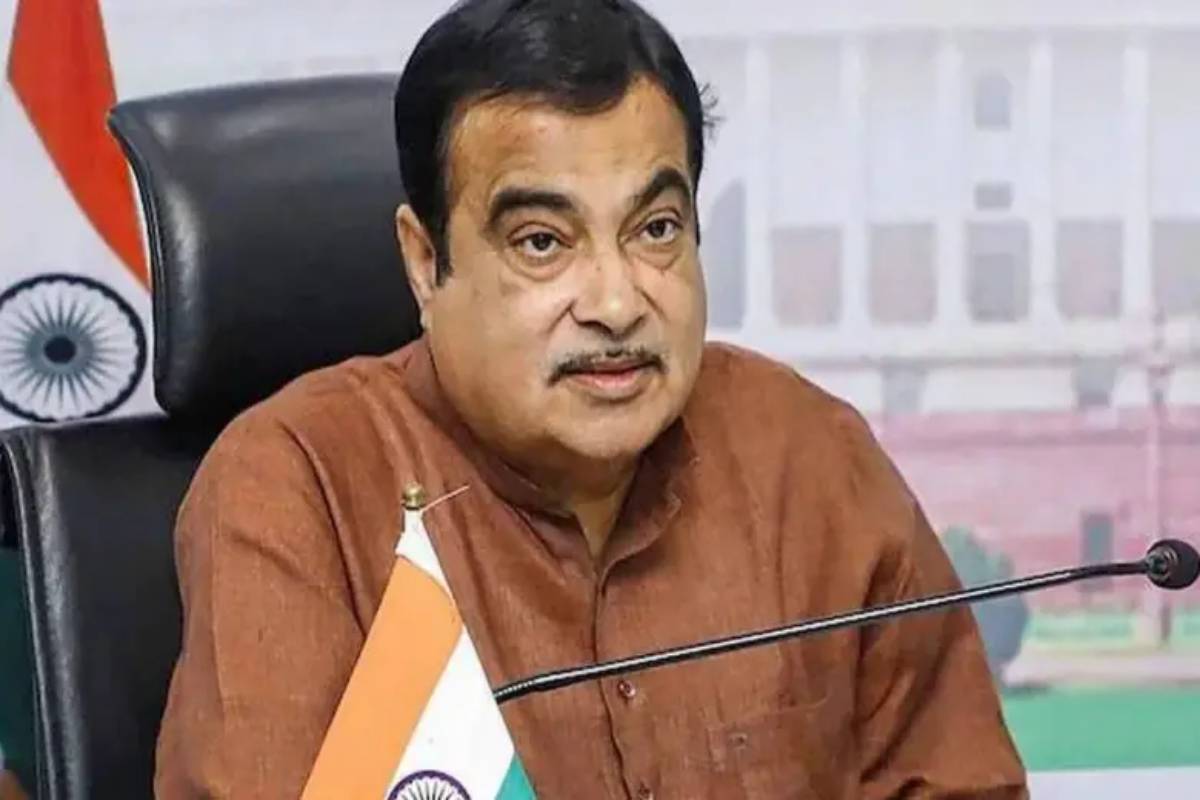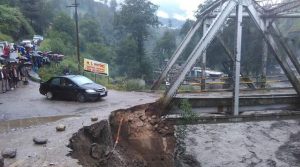More than 650 hectares of Uttarakhand land in grip of forest fires
Though no loss of life has been reported so far, officials say with the rise in mercury level the blaze is going out of control.

Union minister NItin Gadkari (File Photo)
As unprecedented rains and flash floods wreaked havoc and devastation in the hills, development work, particularly the construction of roads and highways, has come under sharp focus in the hilly terrains.
There is growing discontent over the viability of these mega projects. The Union Minister of Road Transport and Highways Nitin Gadkari who visited various parts of Himachal Pradesh has been reviewing the situation in the hill state since the unprecedented tragedies unfolded and brought life to a standstill. Gadkari says that it would be foolish to blame anyone for such natural disasters.
He, however, agrees that the authorities who allowed the rampant construction by the riverside should not allow such things. In an exclusive interview with Aditya Kant and Chandrani Banerjee the minister elaborated on the immediate measures and the long-term plans that the government is taking to restore life to normalcy and minimize the damage in the eventuality of such disasters in the future. Gadkari, who is the longest-serving minister of Road Transport and Highways, and is also known as the Expressway Man of India also mentioned the plans and the new projects that are being taken up to improve road safety and ease of travel on highways. Excerpts:
Advertisement
Q. Since you have visited rain-ravaged places in Himachal and Uttarakhand, what is your assessment of the situation?
A: Unfortunately, the colossal loss to life and property was far beyond what one could fathom. After I visited Kullu and Manali, in particular, I realised the death and destruction that took place was beyond what we had imagined. It was a ‘prakop’ (divine fury) and one could have done nothing to escape it. A team of experts has made an assessment, and measures are being taken to ensure that life is restored at the earliest by repairing the roads and having them running. An added factor was that there was a heavy downpour in a single day in May. As much as 170 mm of rainfall was reported on that particular day. The soil dampened and after that came the rainy season, which was unexpectedly followed by cloud bursts and flash floods and it meant there was no escaping the tragedies that unfolded.

Q. What measures are being taken to deal with the situation?
A: A team of experts from Switzerland has been involved and they have made a presentation. To start with we are working on a flood protection plan. The existing river in Kullu-Manali is changing its course which is causing devastation. Thousands of cars were swept in the flood, Volvo buses vanished, people perished, properties were washed away or were reduced to rubble. We are digging the river. Due to the silt, the volume of the water has decreased. If the water flows through the river bed at the deeper points there would be lesser chances of flooding. Secondly, the stones which are extracted will be used as river banks. We will erect wire-protected walls along the roadsides. We are working on this and I have given a proposal to the environment minister, who has agreed to it in principle. It will definitely help. As far as cloudburst is concerned there is no solution to it.
Q. Could some preventive measures have been taken to avoid or minimise the losses?
A: Cloudbursts and such natural disasters cannot be anticipated. The river suddenly changed its course. Also, if someone is making a house by the side of a river, what can you do about it? Authorities need to look into it. But definitely, we need to have a regulation in place to stop this. The team of experts from Switzerland is looking into the entire gamut of issues. But experts too agree that the tragedy could not have been anticipated. If you look at the affected areas you will find an interspersion of the river, a village, and the road at most of the places. It is a recipe for an impending disaster.
Q. What steps are being taken for Himachal and other affected states to bring life back to normal, and restore roads and traffic?
A:We have reviewed the situation and are now working on a two-pronged strategy. We are taking immediate and long-term measures. To start with, efforts are on to ensure that all the damaged roads are made motorable at the earliest. Huge losses to life and property are being taken care of. Also, the Centre is providing aid to the respective states.
Q. Concerns are being raised over the construction and development activities in the hills. Also, many are suggesting action against authorities for being indifferent, particularly for brazen road cutting?
A: ‘Woh toh moorkhata hogi’ (That would be foolish). If the river changes course and buildings and houses collapse what can you do? No one can be held responsible. This was nature’s fury. But there is no denying the fact that people making houses by the side of the rivers need to be stopped and made aware of the risks involved. Multi-storey buildings and hotels by the riverside is unacceptable. Instead, people should be given spaces by extracting space from the forest areas for the new townships. Otherwise, vulnerability to life will remain. We need a plan which is futuristic and takes care of all such violations.
Q. What is being done to restore highways and roads that have left life paralysed in the hills?
A: We have already started repairing the roads. The funds have been granted and the work has begun on a war footing. But as you would know climate change is taking a big toll on humanity. And that is the concern.
Q. What new measures are being taken to improve travelling on the highways?
A: We are soon going to introduce a satellite-based toll system. Cameras would track number plates and fast tags. From wherever your vehicle makes an entry into the highway, the number of the vehicle would be noted through a fast tag and when the vehicle exits, the number would again be noted and the amount of money would be deducted accordingly. This is an intelligent traffic system. There would be no toll barriers and only cameras would be installed.

Q. What steps are being initiated to improve road safety on the Indian roads?
A: We are now doing a road safety audit. We have developed a road syllabus to make an assessment of the roads. As per the plan, the engineering colleges and IITs would be involved. Each team would audit 100 km long road tracks. They will make assessments about the curves, vulnerable spots, and dangerous zones and make recommendations accordingly.
Q. Despite several initiatives in the past to curb fatal accidents, little has been achieved so far. How do you plan to curb the number of accidents?
A: In one year around five lakh accidents have been reported. We witnessed 1.5 lakh deaths and around three lakh people lose their limbs on highways almost every year. What is worrying is that among those who die on roads, 60 per cent are between 18 and 34 years of age. And despite all our efforts in the last nine years to bring the numbers down, this is the only area of concern in which we could not get the expected results.
Q. Where do you find the ministry is lacking? Where are the gaps?
A: There are some key issues: Road engineering and automobile engineering have been improved to a great extent. As far as enforcement is concerned, we brought in a new road safety law and have raised the fine. We have also brought in a new act and have done everything possible to implement related measures. But there is a lack of awareness regarding road safety and brazenness to not follow the rules. Big celebrities and actors like Amitabh Bachchan and Akshay (Kumar) are helping us by being part of road safety campaigns.
Q. There have been reports that you plan to change the sound of the siren for VIP vehicles?
A: Yes. Plans are afoot and we propose to change the sound of the VIP siren to a more pleasing one. This would be changed to musical instruments like the noise of flute, mouth organ, and tabla. The sirens for the emergency vehicles and police vehicles would remain the same.
Q. How do you look at the NDA’s prospects in the upcoming Lok Sabha elections due next year?
A: Politics of the 21st century is the politics of progress and development. We are celebrating 75 years of Independence. Out of these 75 years, Vajpayeeji had four years, Janata Party had 3 years, Chandra Shekhar and Charan Singh governments too had some years but still, for most of the time the Congress party ruled. What it could not do during its time we have done more than double of that in the last nine years in the road sector. We are the fastest-growing economy in the world. As the water, power, transportation, communication, and infrastructure would improve, industrial and capital investment would come and there would be more employment revenue, which would lead to a better growth rate. I am pretty sure our government would come back under the leadership of Narendra Modi ji again and we will carry forward his vision by further bringing development.
Q. How would the new alliance which was christened I.N.D.I.A affect NDA prospects?
A: Due to our strength the Opposition parties have come together and decided to form an alliance. There is no doubt in anyone’s mind that the NDA would make a comeback under the leadership of Narendra Modiji.
Advertisement